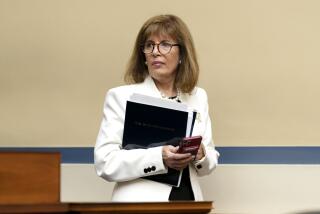Women share graphic sexual harassment stories on Capitol Hill as Congress considers changes

After California’s Rep. Jackie Speier spoke out about being forcibly kissed by a senior staff member when she worked on Capitol Hill in the 1970s, dozens of staffers called the lawmaker to tell their stories.
One woman told Speier she was grabbed by her genitals on the House floor. Some said lawmakers had inappropriately touched them or exposed themselves.
Others said they had been harassed by two sitting members of Congress. Speier (D-Hillsborough) declined to identify those members, saying only that one is a Republican and one is a Democrat.
“The culture in this country has been awakened to the fact that we have a serious epidemic in the workplace in all professions, in all walks of life, and it’s incumbent upon those who are in authority to address it and address it swiftly,” Speier told reporters Tuesday after testifying in front of the House committee that is considering changes in how harassment in Congress is investigated. She said she couldn’t provide more details on the incidents because the victims had signed nondisclosure agreements as part of settlements.
Her aim: to modernize a system that she says discourages victims from coming forward.
The House is moving quickly to approve a resolution to require sexual harassment training for all lawmakers and staff — something committee members stressed is a first step to dealing with Capitol Hill’s sexual harassment problem. The Senate passed a similar resolution last week.
Speier and many others have said Congress must go further and also change its convoluted sexual harassment reporting process.
In the weeks since the first sexual assault and harassment allegations surfaced in the news against Hollywood producer Harvey Weinstein, a flood of victims have come forward with allegations against prominent men in entertainment, media and politics.
At Tuesday’s hearing, other female lawmakers shared similar stories from staffers. Rep. Barbara Comstock (R-Va.) said a female aide told her she delivered documents to her boss’ home and was greeted by the male lawmaker wearing just a towel. The lawmaker, who Comstock said is still serving, then exposed himself to the staffer, she said.
“What are we doing here for women right now who are dealing with somebody like that? It’s time to say, ‘No more,’” Comstock said. “We need to know more examples of what is actually happening and make it easier for victims to come forward.”
The stories echoed dozens that have been detailed by women on Capitol Hill in recent weeks, including reports from five current and former California congresswomen, who told the Associated Press they were harassed by fellow lawmakers. The women didn’t name the colleagues who they alleged harassed them, but said two are still serving in the House.
For someone who works on Capitol Hill to pursue a harassment administrative hearing or a lawsuit against a lawmaker or staff member, they must first go to counseling through the little-known Office of Compliance. The counseling, which can last up to 30 days, informs accusers of their legal rights. The next step before a hearing can be granted is a required mediation with the person they are accusing. During this process, the accuser must sign a nondisclosure agreement. The accuser must provide their own legal counsel. The person accused is represented by House lawyers.
“The present system may have been OK in the Dark Ages; it is not appropriate for the 21st century,” Speier said, calling the process a “hellhole ... to try to traverse.”
Speier plans to file bipartisan legislation this week that would speed up the complaint process, as well as require more transparency about the accused and about how much settlements cost taxpayers. More than 1,500 current and former Capitol Hill staffers have signed a letter asking Congress to change the process.
Speier has pushed for such changes since 2014, but said renewed public attention has made a difference.
“It’s like most issues; there is a tipping point,” Speier said. “I think women have the courage now to come forward and give names and talk about something that is, and has been, just standard operating procedure in business environments.”
Follow @sarahdwire on Twitter
Read more about the 55 members of California’s delegation at latimes.com/politics
ALSO
California could flip the House, and these 13 races will make the difference
Female lawmakers, staffers and lobbyists speak out on ‘pervasive’ harassment in California’s Capitol
California assemblyman was disciplined after woman said he groped her
California Assembly to hold public hearings to address sexual harassment
California Senate hires lawyers and a consultant to examine sexual harassment allegations
Sexual harassment becomes focus in Sacramento
Updates on California politics
More to Read
Get the L.A. Times Politics newsletter
Deeply reported insights into legislation, politics and policy from Sacramento, Washington and beyond. In your inbox three times per week.
You may occasionally receive promotional content from the Los Angeles Times.











